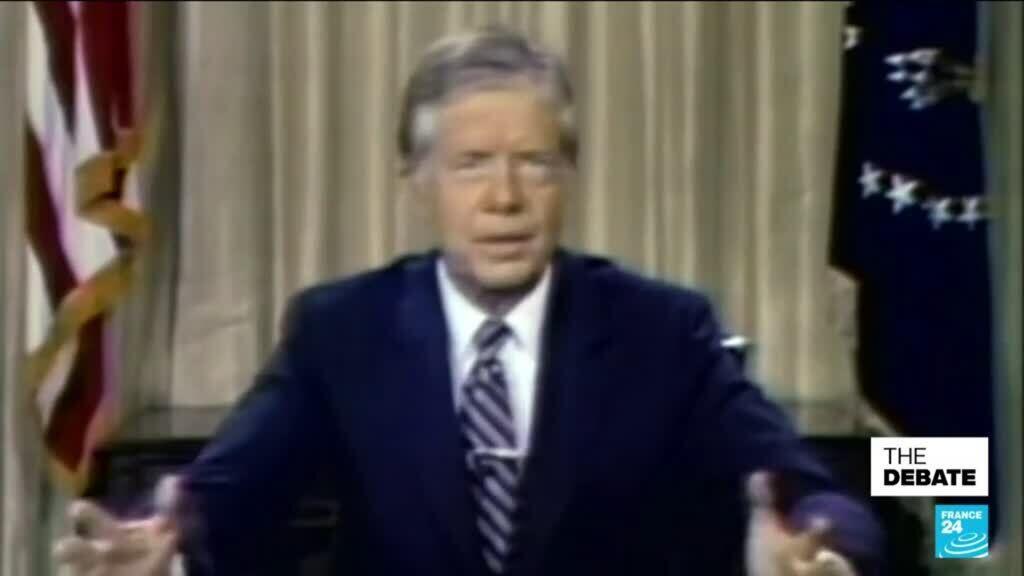
European foreign ministers agreed to meet in late January to discuss lifting sanctions on Syria, the first such regional meeting of Western and Middle Eastern foreign ministers and top diplomats in Saudi Arabia since the fall of President Bashar al-Assad. Meeting. last month.
EU foreign policy chief Kaja Callas said on Sunday that foreign ministers will meet in Brussels on January 27 to discuss how the 27-member bloc will deal with the issue.
In Riyadh, she told reporters that the EU wanted to see an inclusive government in Syria that showed no signs of “radicalization” and respected the rights of women and other groups. She stressed that the EU could quickly reverse any loopholes in sanctions.
Saudi Arabia’s foreign minister called for sanctions on Syria to be lifted after talks in Riyadh on Sunday.
Prince Faisal bin Farhan Al Saud said: “We stress the importance of lifting the unilateral and international sanctions imposed on Syria, as their continuation hinders the Syrian people’s aspirations for development and reconstruction.”
Syria’s new foreign minister Assad Hassan Shabani Repeated calls to lift decades-old sanctionsThe talks were attended along with regional foreign ministers from Saudi Arabia, Egypt, the United Arab Emirates, Qatar, Bahrain, Iraq, Jordan, Lebanon and Turkey.
U.S. Deputy Secretary of State John Bass, German Foreign Minister Annalena Berbock and British Foreign Secretary David Lamy also attended the talks.
A communique issued by the Saudi Foreign Ministry late Sunday reiterated calls for the lifting of sanctions to support Syria’s reconstruction and expressed concern about Israel’s incursion into the occupied Golan Heights.
“(Discussed steps) to support the brotherly people of Syria and provide them with all aid and support during this important stage of their history to help them rebuild Syria as a united, independent and secure Arab state for all its citizens There is no place for them in the country. “Terrorism must not violate its sovereignty nor attack its territorial integrity.” “
Al Jazeera’s Mohammad Jamjoom, reporting from Damascus, said the “substantive” diplomatic meeting in Riyadh focused more on sanctions than the Dec. 14 meeting in Aqaba, Jordan, which focused on ensuring humanitarian Aid is coming in as Syrians feel the adverse effects.
“These sanctions have been in place for a long time and have made it very difficult to import and export raw materials,” he said.
“This means that prices for essential items such as food and medicine are always sky-high. It also means that Syrians cannot carry much fuel, so there are constant power outages.”
The meeting comes as Syria’s new government, led by Hayat Tahrir al-Sham (HTS), urges Lift sanctions Western countries help international money flow to Damascus.
Analyst Rob Geist Pinfold said the Biden administration and European countries are “moving in the direction that HTS wants them to lift sanctions or at least freeze them.”
“The US has said they will freeze sanctions on things like wages for public sector workers or energy supplies, which is crucial,” Pinford, a lecturer at King’s College London, told Al Jazeera.
“Many of these sanctions are secondary sanctions – meaning not only are U.S. citizens or businesses subject to sanctions for doing business with Syria, but other countries or third parties are also subject to sanctions.”
Lift sanctions
The United States released on Monday sanctions exemption Deals were made with Syria’s governing body six months after Assad’s rule ended in an attempt to ease the flow of humanitarian aid.
Germany, Italy and France have urged the EU in recent days to ease sanctions on Syria, but the final decision can only be made by the bloc as a whole.
The EU’s Karas further told reporters in Riyadh that possible priority relief included “those sanctions that hinder nation-building, access to banking services and so on.”
German Chancellor Behrbock said on Sunday that sanctions against Assad’s allies must remain in place because they have “committed serious crimes” during the Syrian war.
“However, Germany proposes a smart sanctions approach to provide relief to the Syrian people. Syrians now need quick dividends from the transition of power,” she added.
On December 8, a lightning-fast rebel offensive overthrew Assad, and HTS, who led the offensive, established a caretaker government and appointed Shabani as foreign minister.
Galip Dalai, a senior consulting fellow at Chatham House in London, said the new government is eager to lift sanctions because it must show people the revolution has improved their lives.
He told Al Jazeera that until the government can deliver on the views highlighted by Western parties, “any assistance will be quite limited in scope and mostly limited to humanitarian aspects.
“Syria needs much more than that, including massive reconstruction. So far we have not seen Western actors show full commitment before some action is taken in Syria.”
The Riyadh meeting was the first to bring together Syria’s new rulers and senior Western officials, and was led by Saudi Arabia.
It follows a meeting in Rome on Thursday of top diplomats from the United States, Britain, France, Germany and the European Union, as well as a landmark meeting hosted in Jordan in December in which regional players expressed concern about Syria. concerns about the new rulers and the actions they need to take to gain international recognition.








